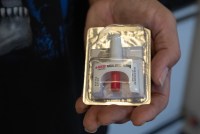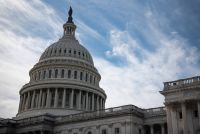Latest KFF Health News Stories
California Gov. Newsom Wants Voters to Approve Billions More to Help the Homeless. Will It Help?
A March 5 ballot initiative seeks $6.4 billion to build thousands of new housing units and provide mental health treatment for homeless people — on top of the billions already being spent to address the public health crisis. Despite significant support from health and law enforcement officials, many front-line workers are skeptical that more money is the answer.
What the Health? From KFF Health News: Alabama Court Rules Embryos Are Children. What Now?
In a first-of-its-kind ruling, the Alabama Supreme Court has determined that embryos created for in vitro fertilization procedures are legally people. The decision has touched off massive confusion about potential ramifications, and the University of Alabama-Birmingham has paused its IVF program. Meanwhile, former President Donald Trump is reportedly planning to endorse a national 16-week abortion ban, while his former administration officials are planning further reproductive health restrictions for a possible second term. Lauren Weber of The Washington Post, Rachana Pradhan of KFF Health News, and Victoria Knight of Axios join KFF Health News’ Julie Rovner to discuss these issues and more. Plus, for “extra credit,” the panelists suggest health policy stories they read this week that they think you should read, too.
Lawsuits Claim South Carolina Kids Underwent Unnecessary Genital Exams During Abuse Investigations
Lawsuits allege that several children under 18 in South Carolina have undergone examinations of their private parts during child abuse investigations — even when there were no allegations of sexual abuse. There’s a growing consensus in medicine that genital exams can be embarrassing, uncomfortable, and even traumatic.
Health Care Workers Push for Their Own Confidential Mental Health Treatment
Montana may join about a dozen other states in creating “safe havens” that keep health care professionals from facing scrutiny from licensure boards for seeking mental health or addiction treatment.
‘Fourth Wave’ of Opioid Epidemic Crashes Ashore, Propelled by Fentanyl and Meth
A report based on millions of urine drug tests found the United States is facing a rise in the use of multiple drugs at once, which not only is often more deadly but complicates treatment efforts.
The Powerful Constraints on Medical Care in Catholic Hospitals Across America
The expansion of Catholic hospitals nationwide leaves patients at the mercy of the church’s religious directives, which are often at odds with accepted medical standards.
Patients See First Savings From Biden’s Drug Price Push, as Pharma Lines Up Its Lawyers
A restructuring of the Medicare drug benefit has wiped out big drug bills for people who need expensive medicines. But the legal battle over drug negotiations means uncertainty over long-term savings.
Southern Lawmakers Rethink Long-Standing Opposition to Medicaid Expansion
While many Republican state lawmakers remain firmly against Medicaid expansion, some key leaders in holdout states are showing a willingness to reconsider. Public opinion, financial incentives, and widening health care needs make resistance harder.
Early Detection May Help Kentucky Tamp Down Its Lung Cancer Crisis
After a decade of work, a Kentucky program launched to diagnose lung cancer earlier is beginning to change the prognosis for residents by catching tumors when they’re more treatable.
Watch: The Feds Reexamine Covid Protocols. Here’s Why You Should Care.
KFF Health News’ Céline Gounder explains the “five-day rule” on covid safety, how guidelines and testing have evolved, and how best to protect yourself and others.
California Prison Drug Overdoses Surge Again After Early Treatment Success
Drug overdose deaths in California state prisons rebounded to near record levels last year, a big setback for corrections officials who thought they were on the right track with medication-assisted treatment efforts. Prison officials and attorneys representing prisoners blame fentanyl.
For the Love of Health Care and Health Policy
KFF Health News shares the crème de la crème of reader-submitted health policy valentines. Two of our favorites melted our hearts and inspired original illustrations.
In Fight Over Medicare Payments, the Hospital Lobby Shows Its Strength
Medicare pays hospitals about double what it pays other providers for the same services. The hospital lobby is fighting hard to make sure a switch to “site-neutral payments” doesn’t become law.
¿Ofrecer vivienda gratis es atención médica? Programas de Medicaid dicen que sí
Estados están invirtiendo miles de millones de dólares en un experimento de atención médica de alto riesgo: utilizar fondos ya escasos de seguros de salud públicos para proporcionar vivienda a los estadounidenses más pobres y enfermos.
GoFundMe, ¿realmente ayuda a pagar facturas médicas?
Incluso defensores de pacientes y personal del área de ayuda financiera en hospitales recomiendan iniciar una sesión en GoFundMe como una alternativa a terminar con una cuenta en una agencia de cobros.
GoFundMe Has Become a Health Care Utility
Resorting to crowdfunding to pay medical bills has become so routine, in some cases health professionals recommend it.
Senators Weigh Whether Health Care AI Needs a Leash
The Senate Finance Committee contemplated the future yesterday: artificial intelligence and its potential applications to health care. And it turns out the future looks an awful lot like the past and present: Democrats want regulations. And the industry wants money. “There are a lot of reasons to be optimistic,” Finance Committee Chair Ron Wyden (D-Ore.) […]
La FDA finalmente prohibiría peligroso químico en productos para alisar el cabello
El primer estudio que vinculó los alisadores de cabello con el cáncer de útero, publicado en 2022, encontró que el uso frecuente de estos químicos duplica con creces el peligro.
FDA’s Plan to Ban Hair Relaxer Chemical Called Too Little, Too Late
The FDA’s recent notice that it would move to ban formaldehyde in hair-straightening products comes more than a decade after researchers raised alarms about health risks. Scientists say a ban would still leave many dangerous chemicals in hair straighteners.
Colorado avanza con proyectos para conectar a trabajadores agrícolas con servicios de salud mental
Los proyectos de ley en consideración abordarían la creciente necesidad de tratar los problemas de salud mental en áreas rurales, que se han visto exacerbados por los impactos de la pandemia y el cambio climático.
























